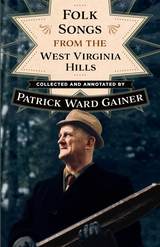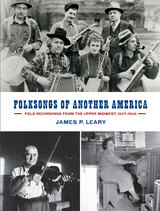4 books about Folk songs

Ethnic Music on Records
A Discography of Ethnic Recordings Produced in the United States, 1893-1942. Vol. 1: Western Europe
Richard K. Spottswood
University of Illinois Press, 1990
This impressive compilation offers a nearly complete listing of sound recordings made by American minority artists prior to mid-1942. Organized by national group or language, the seven-volume set cites primary and secondary titles, composers, participating artists, instrumentation, date and place of recording, master and release numbers, and reissues in all formats. Because of its clear arrangements and indexes, it will be a unique and valuable tool for music and ethnic historians, folklorists, and others.
[more]

Folk Songs from the West Virginia Hills
PATRICK W. GAINER
West Virginia University Press, 2017
First published in 1975 and long out of print, Folk Songs from the West Virginia Hills is a major work of folklore poised to reach a new generation of readers. Drawing upon Patrick Ward Gainer’s extensive ethnographic fieldwork around West Virginia, it contains dozens of significant folk songs, including not only the internationally famous “Child Ballads,” but such distinctively West Virginian songs as “The West Virginia Farmer” and “John Hardy,” among others.
Folk Songs from the West Virginia Hills stands out as a book with multiple audiences. As a musical text, it offers comparatively easy access to a rich variety of folk songs that could provide a new repertoire for Appalachian singers. As an ethnographic text, it has the potential to reintroduce significant data about the musical lives of many West Virginians into conversations around Appalachian music—discourses that are being radically reshaped by scholars working in folklore, ethnomusicology, and Appalachian studies. As a historical document, it gives readers a glimpse into the research methods commonly practiced by mid-twentieth-century folklorists. And when read in conjunction with John Harrington Cox’s Folk Songs of the South (also available from WVU Press), it sheds important light on the significant role that West Virginia University has played in documenting the state’s vernacular traditions.
Folk Songs from the West Virginia Hills stands out as a book with multiple audiences. As a musical text, it offers comparatively easy access to a rich variety of folk songs that could provide a new repertoire for Appalachian singers. As an ethnographic text, it has the potential to reintroduce significant data about the musical lives of many West Virginians into conversations around Appalachian music—discourses that are being radically reshaped by scholars working in folklore, ethnomusicology, and Appalachian studies. As a historical document, it gives readers a glimpse into the research methods commonly practiced by mid-twentieth-century folklorists. And when read in conjunction with John Harrington Cox’s Folk Songs of the South (also available from WVU Press), it sheds important light on the significant role that West Virginia University has played in documenting the state’s vernacular traditions.
[more]

Folksongs of Another America
Field Recordings from the Upper Midwest, 1937–1946
James P. Leary
University of Wisconsin Press, 2018
Challenging and considerably broadening popular and scholarly definitions of American folk music, Folksongs of Another America recovers the diverse, multilingual traditions of immigrant, Native American, rural, and working-class performers in America's Upper Midwest during the 1930s and 1940s. The book extensively documents 187 tunes and songs in more than twenty-five languages, with full original lyrics and English translations, and biographical notes on the performers. The companion musical tracks and documentary film will be freely available for listening, viewing, or download through a partnership with the University of Wisconsin Libraries' Digital Collections Center.
[more]

Morning Dew and Roses
Nuance, Metaphor, and Meaning in Folksongs
Barre Toelken
University of Illinois Press, 1995
"A major academic work that is also brilliantly, clearly, humanely, and poetically written. It can be enjoyed not only by ballad and bawdry scholars but by everyone who picks it up." -- Kenneth S. Goldstein, University of Pennsylvania, former president of the American Folklore Society
"Toelken's insights . . . are unique. His study broadens and deepens scholarly appreciation of how folksong metaphors carry their own semantic weight. . . . One of the best expressions of the power of music in folksong that I have seen in recent years." -- James Porter, author of The Traditional Music of Britain and Ireland
In this lively exploration of folksongs and their meanings, Barre Toelken looks closely at riddle songs and other ambiguous folksongs, as well as the various "ballad commonplaces." Ranging through metaphors such as weaving, plowing, plucking flowers, and walking in the dew, Toelken shows how each contributes to meaning in vernacular song. He includes comparisons to German folksongs, medieval poetry, Italian folk lyrics, and a wide range of Euro-American vernacular expression.
"Toelken's insights . . . are unique. His study broadens and deepens scholarly appreciation of how folksong metaphors carry their own semantic weight. . . . One of the best expressions of the power of music in folksong that I have seen in recent years." -- James Porter, author of The Traditional Music of Britain and Ireland
In this lively exploration of folksongs and their meanings, Barre Toelken looks closely at riddle songs and other ambiguous folksongs, as well as the various "ballad commonplaces." Ranging through metaphors such as weaving, plowing, plucking flowers, and walking in the dew, Toelken shows how each contributes to meaning in vernacular song. He includes comparisons to German folksongs, medieval poetry, Italian folk lyrics, and a wide range of Euro-American vernacular expression.
[more]
READERS
Browse our collection.
PUBLISHERS
See BiblioVault's publisher services.
STUDENT SERVICES
Files for college accessibility offices.
UChicago Accessibility Resources
home | accessibility | search | about | contact us
BiblioVault ® 2001 - 2024
The University of Chicago Press









